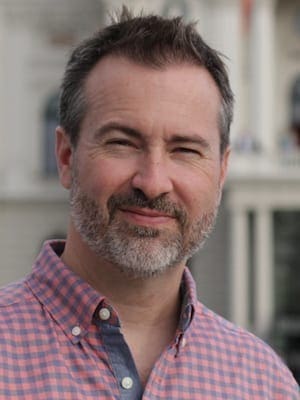Producing and directing a documentary on Baptists and Muslims has been eye-opening.
As Robert Parham, the Baptist Center for Ethics’ executive director, and I traveled to various states documenting friendships and initiatives between Baptists and Muslims, we occasionally had opportunity to mention to strangers what we were working on.
As I gathered footage around the courthouse in Columbia, Tenn., a sheriff’s deputy approached. Robert struck up a conversation and explained we were working on a documentary.
The deputy asked about what.
“It’s about the relationship between Baptists and Muslims,” Robert said.
The look on the deputy’s face was priceless. It betrayed his thinking, which he shared by saying, “Is there one?”
Imagine: Baptists and Muslims both claim to love God, and both have sacred texts affirming the importance—the centrality, even—of loving neighbor. Yet here was a gentleman who was shocked that they would have any sort of relationship.
His remark was repeated by others almost verbatim during the months we worked on the project and explained it to others. Their disbelief in a Baptist-Muslim relationship, of course, didn’t grow in a vacuum. It was cultivated by extremism of word and deed.
Some Baptist churches have sought to instruct their followers about Islam. They have lettered church marquees with “Islam: A Wicked Religion” or similarly loving phrases. They have played up and preyed upon fear.
When pressed, some Baptist leaders who hype hysteria about Islam will allow that most Muslims are peace-loving. But that’s not the message they share with parishioners. That’s not the Wednesday-night series.
If a fear of radical Islam motivates you, but if you also believe some Muslims are peace-loving, then you ought to be first in line to shake hands with, befriend and support those peace-loving Muslims—who comprise the vast majority.
This project prompted me to get to know Muslims in a way I never had before. I leave this project changed – and saddened.
Saddened because that is an appropriate response to seeing firsthand how we, God’s children and servants, have traded love for fear. Too many of us have defaulted on the sweet demands of our sacred texts.
Yet I have been privileged to see and document how some—both Baptists and Muslims—conquered fear. They embraced their texts and, finding commands to love, embraced each other.
When people learn henceforth of Baptist-Muslim relationships, they should not be shocked. That bewildered look of response should not cross their faces.
Nor should they be impressed, for we do not deserve praise for doing that which God has commanded us to do.
Instead, news of a Baptist-Muslim relationship should simply make sense and be no news at all.
Cliff Vaughn is managing editor and media producer for EthicsDaily.com. “Different Books, Common Word: Baptists and Muslims” will begin airing on ABC-TV stations in January. Check local listings.

